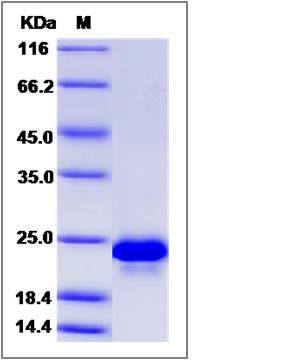Canine VEGF / VEGFA Protein
VEGFA, VEGF
- 100ug (NPP1605) Please inquiry
| Catalog Number | P70004-DNAH |
|---|---|
| Organism Species | Canine |
| Host | Human Cells |
| Synonyms | VEGFA, VEGF |
| Molecular Weight | The recombinant canine VEGFA comprises 164 amino acids and has a predicted molecular mass of 19.1 kDa. The apparent molecular mass of the protein is approximately 23 kDa in SDS-PAGE under reducing conditions due to glycosylation. |
| predicted N | Ala 27 |
| SDS-PAGE |  |
| Purity | > 95 % as determined by SDS-PAGE |
| Protein Construction | A DNA sequence encoding the canine VEGFA(NP_001103972.1) (Met1-Arg190) was expressed. |
| Bio-activity | Immobilized canine VEGFA at 10 μg/ml (100 μl/well) can bind human VEGFR2-Fc (P10012-H02H), The EC50 of human VEGFR2-Fc (P10012-H02H) is 33.83-78.95 ng/ml. |
| Research Area | Cardiovascular |Angiogenesis |Growth Factor & Receptor |Vascular Endothelial Growth Factor (VEGF) & Receptor |Vascular Endothelial Growth Factor (VEGF) |
| Formulation | Lyophilized from sterile PBS, pH 7.4. 1. Normally 5 % - 8 % trehalose and mannitol are added as protectants before lyophilization. Specific concentrations are included in the hardcopy of COA. |
| Background | Vascular endothelial growth factor (VEGF), also known as vascular permeability factor (VPF) and VEGF-A, is a potent mediator of both angiogenesis and vasculogenesis in the fetus and adult. It is a member of the platelet-derived growth factor (PDGF)/vascular endothelial growth factor (VEGF) family and often exists as a disulfide-linked homodimer. VEGF-A protein is a glycosylated mitogen that specifically acts on endothelial cells and has various effects, including mediating increased vascular permeability, inducing angiogenesis, vasculogenesis and endothelial cell growth, promoting cell migration, inhibiting apoptosis and tumor growth. VEGF-A protein is also a vasodilator that increases microvascular permeability, thus it was originally referred to as vascular permeability factor. |
| Reference |
